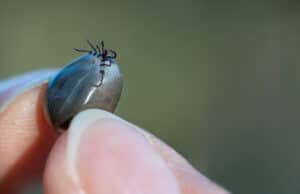Ticks, the small blood-sucking arachnids, are commonly associated with warmer months. However, as winter arrives and the temperatures drop, one may wonder where these tiny creatures go.
Interestingly, ticks have developed fascinating ways to withstand the cold and endure the winter season. These mechanisms are critical for their survival during this challenging time of the year.
Let’s explore the distinct methods ticks have evolved to ensure their survival.
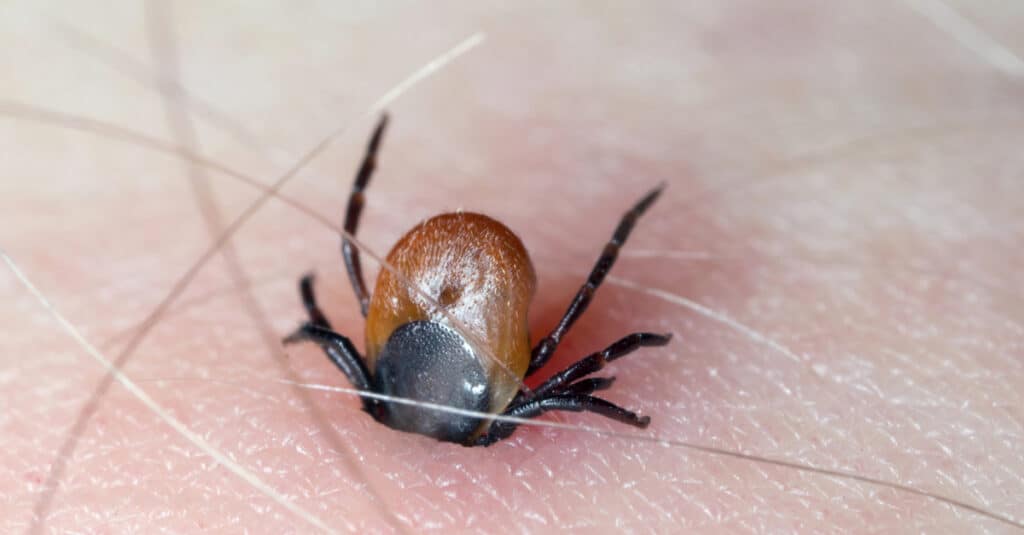
Ticks, the small blood-sucking arachnids, are commonly associated with warmer months.
©Tomasz Klejdysz/Shutterstock.com
Ticks
They are found all over the world and are known for their ability to transmit diseases such as Lyme disease, Rocky Mountain spotted fever, and tick-borne encephalitis.
Ticks have an oval-shaped body and are typically the size of an apple seed when unfed but can expand to many times their original size when engorged with blood. Their bodies are covered with a hard exoskeleton that protects them from damage and dehydration, and they have eight legs that allow them to crawl over their host. Ticks vary in color depending on the species and their stage in life, but most are brown or black.
Ticks are blood feeders, and they require a blood meal to molt into the next stage of their life cycle. They feed on various hosts, including mammals, birds, reptiles, and amphibians. Some ticks are specific to certain hosts, while others are more generalist feeders. Ticks locate their hosts by detecting body heat, carbon dioxide, and other chemicals.
Ticks are found in a number of habitats, including forests, grasslands, shrublands, and even urban environments. They prefer moist and humid environments, as they are susceptible to dehydration. Ticks can be found in leaf litter, tall grass, and other vegetation, waiting for a host to come by.
Ticks go through four life stages: egg, larva, nymph, and adult. The length of the life cycle varies depending on the species but can range from several months to 3 years. Ticks typically spend most of their life off their host, waiting for the right opportunity to feed.
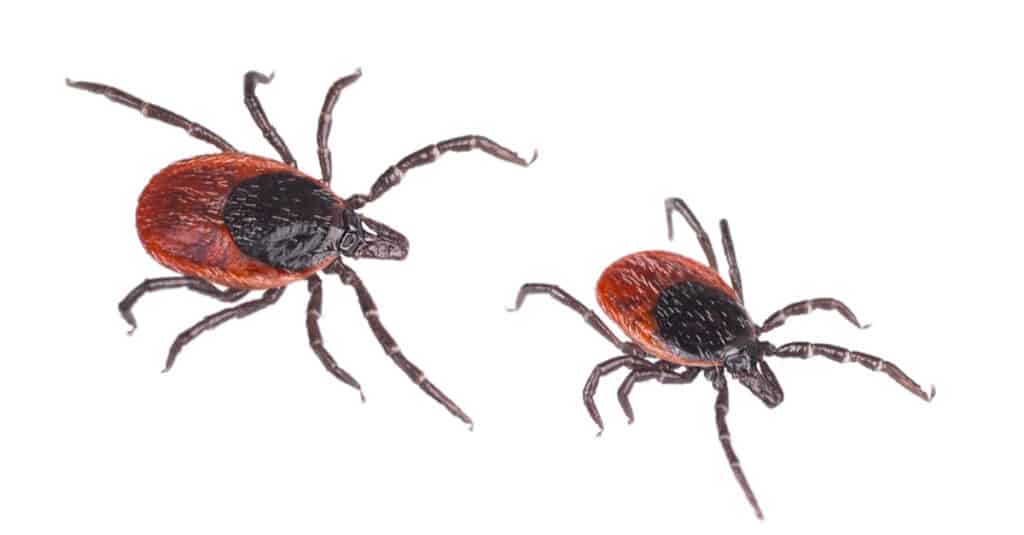
The length of the life cycle varies depending on the species but can range from several months to 3 years.
©KPixMining/Shutterstock.com
Do Ticks Migrate?
Ticks do not migrate in the same way that birds or some other animals do. However, ticks can be transported over long distances by hosts that carry them, such as birds, deer, and other mammals.
Ticks can also be transported to new locations by humans, either intentionally or unintentionally, through activities such as hiking, camping, or traveling with pets. When humans move to new areas, they may bring ticks with them, which can lead to the establishment of new tick populations.
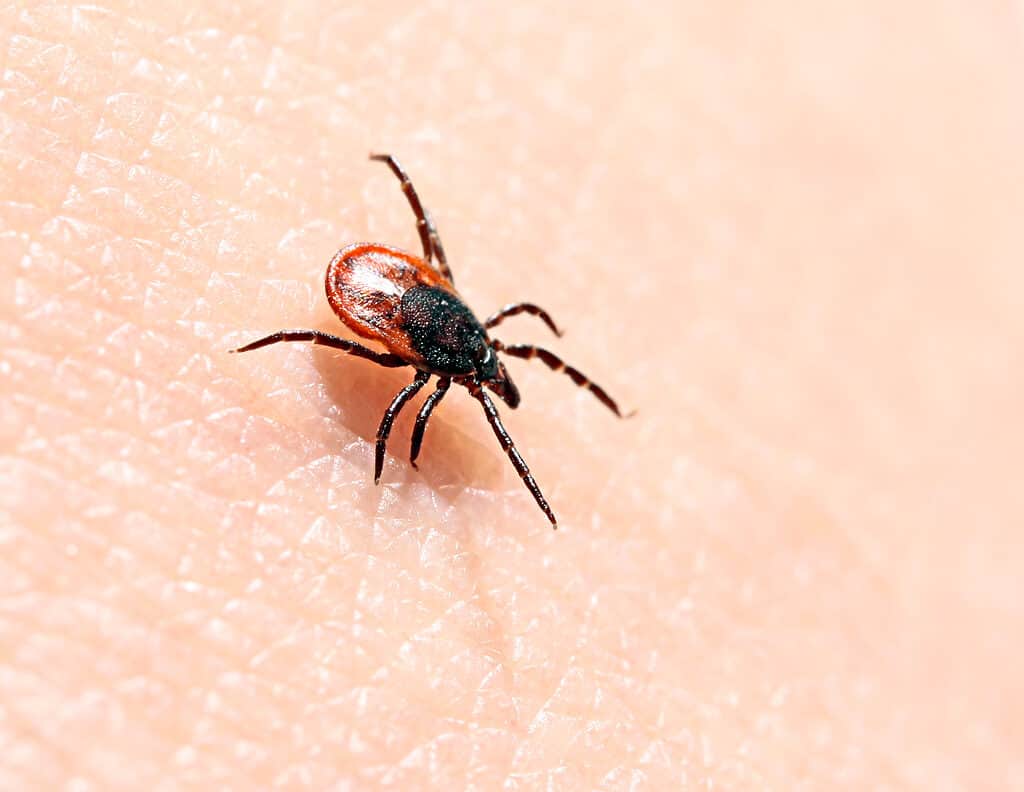
Ticks can be transported over long distances by hosts that carry them.
©daksel/Shutterstock.com
Why Don’t Ticks Migrate?
Ticks do not migrate because they lack the physical capability to undertake long-distance movements. Unlike birds and other animals that can migrate long distances, ticks do not have wings, and they are not strong enough to travel long distances by walking or running.
Ticks can only move by crawling or attaching themselves to a host, which limits their ability to travel long distances.
Furthermore, ticks are adapted to specific habitats, and they tend to stay within a particular area where they can find suitable hosts and conditions for survival. For example, some ticks prefer to live in dense vegetation, while others prefer to live in leaf litter or soil.
Where Do Ticks Go in the Winter?
They are often associated with summertime and outdoor activities like camping and hiking. However, ticks can remain active during the winter months and can be more dangerous during this time. As winters are starting later and becoming milder, the possibility of ticks being active for a longer period of time is increasing. In fact, ticks can even emerge in the middle of winter if the season experiences a warm spell.
The misconception that ticks die off during the colder months is not true. They have various ways of preparing for winter, with the most common being to go dormant and wait it out. Ticks may burrow underground to keep warm or seek shelter in debris piles.
Different types of ticks have various winter survival methods. The American dog tick and lone star tick, for example, are not usually active during the winter months but will go dormant instead. Meanwhile, the black-legged tick, also known as the deer tick, will remain active during the colder months as long as the temperature remains above freezing.

This means that ticks in the winter could still be actively searching for a host before or during the cold season.
©iStock.com/digitalg
What Do They Do in the Winter?
If a tick has not fed before entering dormancy, it may seek out a host to feed on and spend the winter with. This means that ticks in the winter could still be actively searching for a host before or during the cold season.
Do Ticks Hibernate in the Winter?
They do not undergo hibernation during cold weather. While it may seem like ticks and other cold-blooded organisms go into hibernation, this is not actually the case.
Instead, when temperatures drop, cold-blooded creatures enter a state of reduced energy expenditure. This state may resemble hibernation, as the creatures may remain inactive for extended periods of time, spanning days, weeks, or even months. However, unlike hibernation, this state can be easily disrupted by the introduction of warmth.
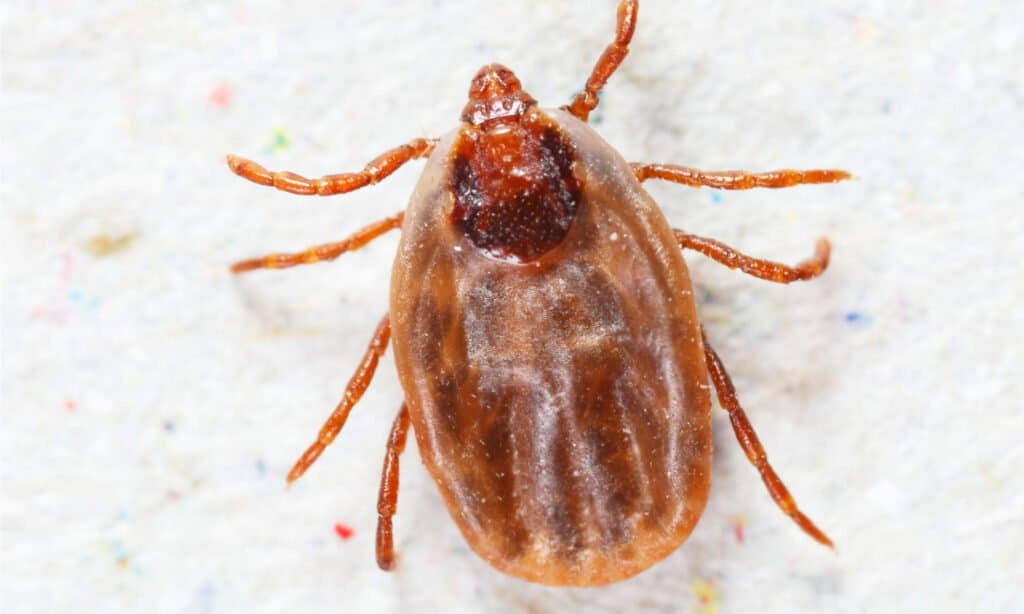
The warmth provided by the host’s body allows ticks to remain active even in frigid conditions.
©7th Son Studio/Shutterstock.com
Can Ticks Survive Cold Weather?
They are parasitic organisms that thrive on warm-blooded hosts. Unlike ticks, these warm-blooded hosts are capable of regulating their own body temperature.
The warmth provided by the host’s body allows ticks to remain active even in frigid conditions. As a result, they can continue to thrive and feed on the blood of their host. Even when the external temperature drops to extremely low levels.
Do Ticks Die in the Winter?
Unless the temperature drops to freezing levels, ticks can survive the winter season without perishing. Normally, ticks become dormant at temperatures lower than 35 degrees Fahrenheit, and only extreme cold, such as below 14 degrees Fahrenheit, can lead to their demise.
During the colder months, winter ticks may find refuge by clinging to a warm-blooded host like a deer, cow, elk, or horse. Humans are typically not the preferred hosts for these ticks.
The photo featured at the top of this post is © iStock.com/epantha
FAQs (Frequently Asked Questions)
Why are ticks so dangerous?
Ticks, small bloodsucking parasites, are capable of feeding on a wide range of animals, including humans.
The danger associated with ticks is that they can transmit harmful bacteria to their hosts through their bites. One such bacterium is Borrelia Burgdorferi, which causes Lyme disease and can have serious consequences for human health.
Can ticks live in your bed?
Your bedding, including your sheets, pillows, and blankets, can be a favorite spot for ticks to attach themselves and feed on their human hosts. What makes them particularly dangerous is that once they latch onto you, they can remain attached for days without being detected.
Can ticks lay eggs on humans?
Ticks cannot lay eggs directly on their host as they must detach themselves completely from their host to begin the reproduction process.
Can ticks cause death?
According to the Centers for Disease Control and Prevention (CDC), Rocky Mountain Spotted Fever (RMSF) is deemed a fatal tick-borne illness worldwide. In untreated cases, the onset of symptoms can lead to death in as little as 8 days, even in people who were previously in good health.
Where do ticks live?
Ticks are most commonly found in specific types of environments, such as tall grass or brush, wooded areas, and at the edges where woods meet lawns. They can also be found under ground-cover plants, in the leaf litter, around woodpiles and stone walls, where small mammals that serve as hosts for ticks tend to live.
Can ticks jump from dogs to humans?
Ticks consider dogs to be ideal hosts and can easily attach themselves to the dog’s body when in outdoor environments. When the dog comes indoors, the ticks can drop off and potentially attach themselves to a human in the home.
Thank you for reading! Have some feedback for us? Contact the AZ Animals editorial team.





